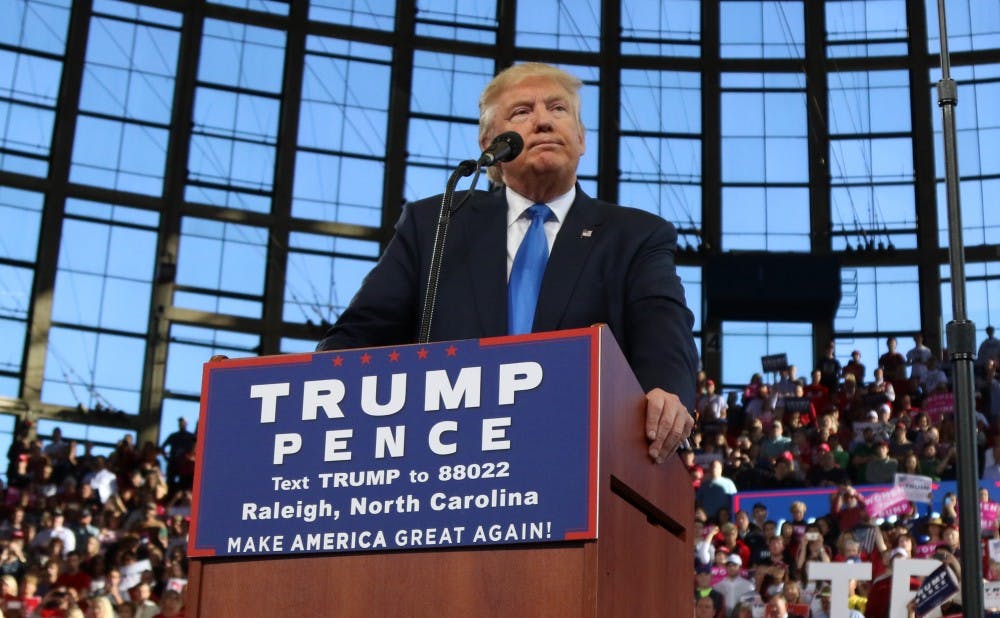Two important questions remain as President Donald Trump begins his third year in office. What have been some of the main legal issues underlying Trump’s entanglements in the past two years, and where can we expect it to take us in 2019?
Since Robert Mueller was appointed as special counsel overseeing the ongoing Russia investigation, there have been 37 indictments—six of which were associates of the president, including Michael Flynn, Paul Manafort and, most recently, Roger Stone.
Lisa Griffin—Candace M. Carroll and Leonard B. Simon professor of law—told The Chronicle that the legal entanglements of Michael Cohen in particular stood out to her. According to admissions Cohen made in court, Cohen said he was directed by the president to pay two different women, Stormy Daniels and Karen McDougal, in order to maintain their silence during the campaign.
“Both of those payouts were unrecorded, unauthorized campaign expenditures of $130,000 each," Griffin said. "The failure to document and account for campaign expenses is an offense, and the effort to conceal [those expenses] compounds the offense."
In August 2018, Cohen, the president's former lawyer, pleaded guilty in a case handled by the United States attorney’s office in the southern district of New York, stating that Trump directed him to make the payments in order to quiet the women during the campaign. Trump has argued that the payments were under his personal expenditures.
Griffin said that it is highly unlikely for Trump, a sitting president, to undergo a criminal trial and be charged with a crime.
“It is true, though, that the president was named as a criminal actor and as a co-conspirator, [or], an un-indicted co-conspirator,” Griffin said.
If Trump loses the 2020 election, the charges could be brought up against him after he leaves office, since the statute of limitations for most federal offenses is five years, she explained.
“If [Trump] does not win re-election, in January of 2021, when he leaves office, the statute of limitations will not yet have run on those offenses and he could be charged," Griffin said. "That said, I think it is still highly unlikely that we will ever see a criminal trial of the president. I think it is possible that he will negotiate a plea or an immunity deal or pardon that precludes a criminal trial.”
Impeachment as a viable form of punishment also seems exceedingly unlikely, given that impeachment is a political concept rather than a legal one, Griffin said. She added that it is implausible that the currently Republican-controlled Senate would vote to convict Trump.
“There are still a number of ways in which the president, the president’s businesses, the president’s financial interest and the president’s family face jeopardy,” Griffin said. “The same concerns that would apply to a sitting president, of course, do not apply to [a] member of his family nor do they apply to potential charges involving the Trump Organization’s business activities which [increasingly] seem to include money-laundering.”
Due to how secretive, leak-free and unpredictable the special counsel has been thus far, it is almost impossible to predict where the investigation will go next.
“Everyone who has stated publicly that the investigation is about to wrap up has been wrong so far,” Griffin said.
The special counsel's office could issue more indictments, or they could issue a report detailing the findings so far. There has been even more uncertainty since Trump nominated William Barr, former Attorney General in the first Bush administration, to replace Jeff Sessions in December 2018.
Barr, who has yet to be confirmed by the Senate Judiciary Committee, had previously written a memo that was skeptical about the Mueller investigation, specifically criticizing Mueller's inquiry into whether Trump obstructed justice as being "fatally misconceived." At the Senate Judiciary Committee hearing, Barr said it was "vitally important" for Mueller to be able to finish the investigation.
Griffin points out that Mueller's report may not necessarily become publicly available and certainly wouldn’t be publicly available in its entirety.
“The special counsel’s regulations require Robert Mueller to issue his report to the justice department [first],” she said. “Most likely he will be issuing that report to attorney general [William] Barr after his confirmation, and then the attorney general will issue a report summarizing those findings. Perhaps there are some things he may choose not to report.”
Get The Chronicle straight to your inbox
Signup for our weekly newsletter. Cancel at any time.

Mona Tong is a Trinity senior and director of diversity, equity and inclusion analytics for The Chronicle's 117th volume. She was previously news editor for Volume 116.

